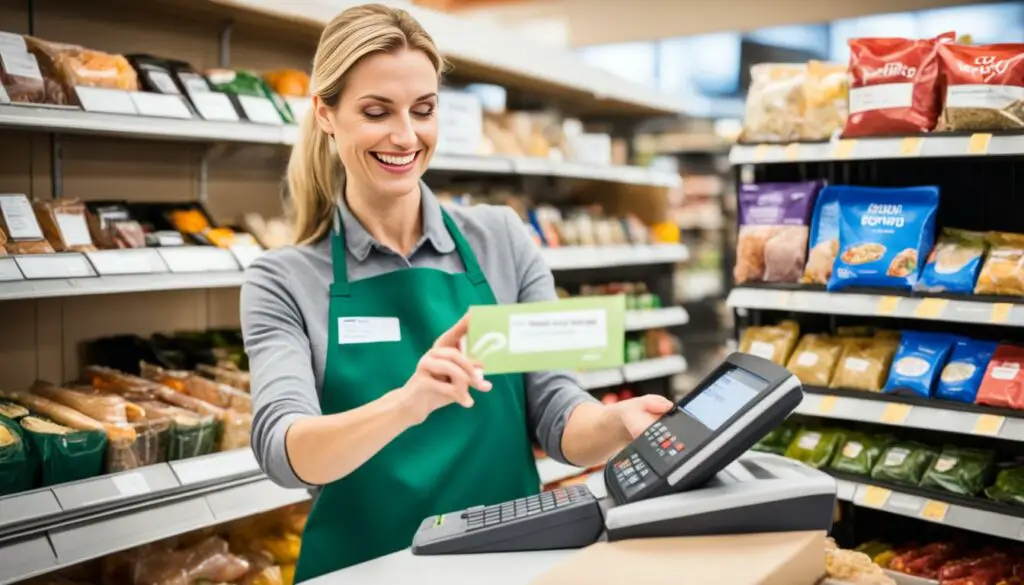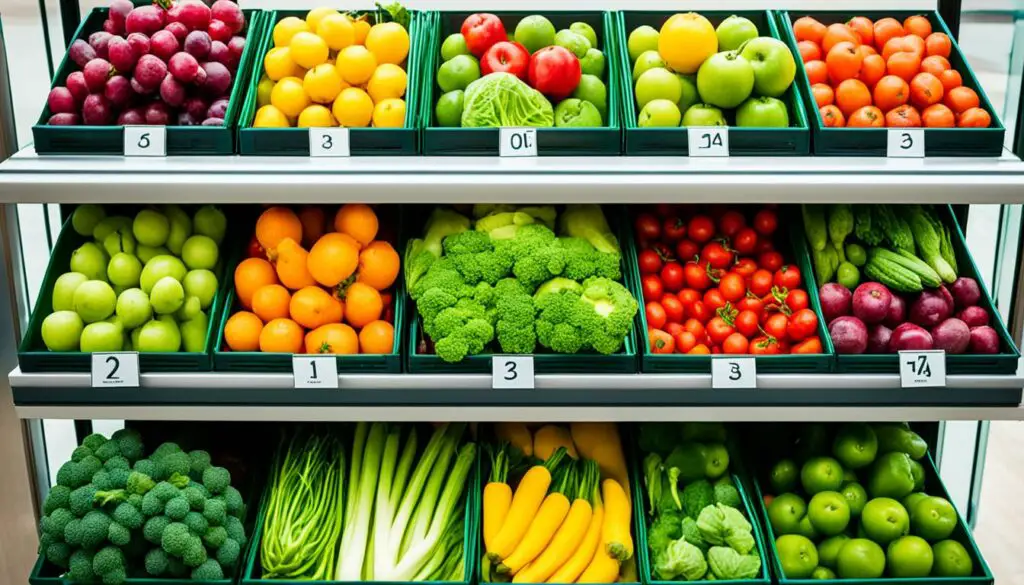Did you know that you can return food items to a grocery store if they have gone bad, expired, or if you simply don’t like them? It’s true! Returning food that is spoiled or past its expiration date is a common practice that allows you to get your money back or exchange it for something else. But it’s not just about getting a refund. Returning food also helps the store address any issues with the product, such as improper rotation or potential recalls.
Table of Contents
Key Takeaways:
- Returning food items to a grocery store is allowed if they are spoiled, expired, or unsatisfactory.
- Returning food helps you get a refund or exchange, and it also allows the store to address product issues.
- Keep receipts and pay with a debit card for easier return processing.
- Each grocery store may have different return policies, so familiarize yourself with them.
- Returning food contributes to the improvement of product quality and services offered by the store.
When Can You Return Food to a Grocery Store?
Returning food to a grocery store is typically allowed under certain conditions. Generally, you can return food items if they are spoiled, expired, or if you simply don’t like them. However, each store may have specific policies and guidelines for returning different types of food items, such as produce, fresh flowers, meat, bakery products, deli items, dairy products, and frozen goods.
Initiating the food return process is convenient and hassle-free, thanks to the store’s various digital platforms and customer accounts. Starting the process through the store’s app or online platform ensures a seamless experience. While some stores may require a receipt for the return, many will accept returns without one, making the process more accessible.
If possible, it is recommended to include the original packaging when returning the food item. The packaging helps the store identify the product and ensures a smoother return process.
Each grocery store may have its own timeframe for accepting returns, but it typically falls within a 7 to 14-day window. Some stores may even offer additional guarantees or double the refund for dissatisfied customers, making it even more advantageous to return food items.
Now, let’s take a closer look at the specific return policies of major grocery stores and the benefits of returning food items in the subsequent sections.
Example Table: Return Timeframes for Major Grocery Stores
| Grocery Store | Return Timeframe | Return Policy Details |
|---|---|---|
| Walmart | Up to 90 days | Refund or exchange on produce, fresh flowers, meat, bakery, deli, dairy, and frozen items |
| Aldi | Within a reasonable time | “Twice as Nice Guarantee” – refund and replacement for unsatisfactory items |
| Target | Within 90 days | Return or exchange for most items, including food products |
Note: Return timeframes and policies may vary by location, so it’s essential to check the specific policies of the grocery stores in your area for accurate and up-to-date information.
Return Policies of Major Grocery Stores
When it comes to returning food items to a grocery store, it is important to be aware of the return policies of each establishment. Different stores have varying guidelines and procedures in place to handle returns. Here, we will explore the return policies of two major grocery store chains: Walmart and Aldi.
Walmart Food Return Policy
At Walmart, customers can return food items with a receipt within 90 days of purchase for a refund or exchange. This policy allows shoppers the flexibility to return items if they are dissatisfied or if the product doesn’t meet their expectations.
Walmart also has a freshness guarantee for perishable groceries. If a customer purchases perishable items that don’t meet their freshness expectations, they can request a refund. This ensures that customers can shop with confidence, knowing that their perishable groceries are of high quality.
It is worth noting that not all items may be returnable, but they may still be refundable. It is recommended to check the specific return policies for each item or category of items to ensure eligibility for a return or refund.
Aldi Food Return Policy
Aldi is another grocery store chain that accepts returns. Aldi has a policy known as the “Twice as Nice Guarantee,” which allows customers to return an item they are unsatisfied with and receive both a replacement and a refund. This policy provides an extra level of assurance to customers, demonstrating Aldi’s commitment to customer satisfaction.
Similar to Walmart, not all items may be eligible for return, but Aldi’s “Twice as Nice Guarantee” ensures a hassle-free experience for customers who encounter issues with their purchases.
It is important to review the return policies of the specific grocery stores you frequent, as there may be additional requirements or conditions for returning food items.
Overall, understanding the return policies of major grocery stores such as Walmart and Aldi can help you make informed decisions when it comes to returning food items. By familiarizing yourself with these policies, you can shop with confidence, knowing that your groceries are backed by customer-friendly return guidelines.
Etiquette and Considerations for Food Returns

Returning food to a grocery store is not only a matter of convenience but also an opportunity to ensure quality products for all consumers. When considering a food return, it is important to be mindful of certain etiquette and factors that can contribute to a smoother process. While returning perishable items that have spoiled or expired is generally acceptable, returning food items solely based on personal taste preferences may not always be considered a valid reason for a return.
Each person’s tastes differ, and stores may not refund or exchange items solely for this reason. Instead, it is advisable to exercise caution when purchasing items that are subjective to personal preferences. By making informed purchasing decisions, you can avoid situations where you dislike the taste of the item.
If a food item has quality issues or doesn’t meet your expectations, it is worth communicating this feedback to the store or even the product manufacturer. Your feedback can contribute to improving the overall quality of products and services. Sharing your experience can help address any potential quality concerns, allowing stores to take appropriate measures to rectify the situation and ensure customer satisfaction.
Returning food solely based on personal preference may not always be accepted, as taste is subjective. It is important to keep in mind that your taste preferences may differ from others, and stores have policies in place to ensure fairness and consistency.
By maintaining a positive and respectful approach when returning food, you contribute to a better shopping experience for both yourself and other shoppers. Understanding that personal taste preference is not generally a valid return reason can help build stronger relationships between consumers and grocery stores, as well as foster a sense of understanding within the community.
Considering Quality Factors
When contemplating a food return, it is crucial to assess the quality factors that warrant a return. Spoiled or expired perishable items, such as fruits, vegetables, dairy products, or meat, are clear indicators of quality issues and are typically accepted for returns.
However, it is important to note that returning food for personal tastes should be approached with discretion. Grocery stores prioritize providing quality products for their customers, but taste preferences can vary widely. While one individual may not enjoy a particular food item, another may find it delicious.
Communicating Quality Issues
If you encounter a food item that does not meet your expectations or has quality issues, consider providing feedback to the store or the product manufacturer. This enables them to address any concerns and take appropriate measures to improve the overall quality of their products.
It is also essential to keep in mind that your feedback can contribute to identifying potential recalls or product safety issues. By reaching out to the store, you play a vital role in ensuring the safety and well-being of all consumers.
Table: Valid Reasons for Food Returns
| Valid Reasons for Food Returns |
|---|
| If perishable food items are spoiled or expired |
| If the food item has quality issues or doesn’t meet expectations |
| If there are safety concerns or recalls related to the product |
As a responsible consumer, understanding the considerations and etiquette of food returns helps establish a harmonious relationship between consumers and grocery stores. By being mindful of the valid reasons for returns and providing constructive feedback, you contribute to the improvement of product offerings and overall quality standards.
Tips for Returning Food to a Grocery Store
Returning food to a grocery store can be hassle-free if you keep a few tips in mind. Whether you need to return food items with no receipt or open packages, following these guidelines will ensure a smoother return process.
- Keep your receipts: While some stores accept returns without a receipt, having it on hand makes the process easier. The receipt serves as proof of purchase and helps facilitate the return.
- Pay with a debit card: Using a debit card for your purchase allows the store to look up the transaction in their system. This is especially helpful if you misplace your receipt and need to provide proof of purchase.
- Include original packaging: When returning a food item, it’s best to bring it back with the original packaging. This helps the store identify the product and ensures a smoother return process.
- Return as soon as possible: It’s advisable to return the food item as soon as you can, preferably within 7 to 14 days of purchase. Returning it promptly allows the store to address any potential quality issues and ensures a higher likelihood of a refund or exchange.
- Familiarize yourself with return policies: Each grocery store may have its own specific return policies. Take the time to understand the requirements and procedures of the grocery stores you frequently visit. This knowledge will help you navigate the return process more effectively.
By following these tips, you can have a smoother and more efficient experience when returning food items to a grocery store. Remember to keep your receipts, pay with a debit card, include original packaging, return the item promptly, and familiarize yourself with the return policies of the stores you shop at. These simple steps will make the return process easier for both you and the store.
Benefits of Returning Food to a Grocery Store

Returning food to a grocery store not only benefits you but also the store and other customers. By returning spoiled or expired items, you can get your money back or exchange for a better product. Additionally, you are helping the store identify quality issues that may have occurred, such as improper rotation or storage of products. This feedback enables the store to address the concerns and potentially prevent similar issues in the future.
Returning food is more than just a personal transaction; it’s an opportunity to make a difference. By participating in the return process, you contribute to the overall improvement of the products and services offered by the grocery store.
Returning food also plays a crucial role in addressing potential recalls. If multiple customers return the same item, the store can notify the manufacturer and take necessary action to ensure the safety and quality of the product. This helps protect not only other customers but also the store’s reputation as a reliable provider of groceries.
| Benefits of Returning Food to a Grocery Store |
|---|
| Provides you with a refund or exchange |
| Helps the store identify quality issues |
| Prevents future issues with products |
| Enables the store to address potential recalls |
By participating in the return process and providing feedback on your experience, you are empowering the grocery store to continuously improve its products and better serve its customers. So don’t hesitate to return food items that don’t meet your expectations. Your actions can make a difference and contribute to a better shopping experience for everyone.
How to Make a Food Return at a Grocery Store

The process of making a food return at a grocery store may vary slightly depending on the store, but these are the general steps to follow:
- Check the return policy: Familiarize yourself with the specific return policy of the grocery store. This will help you understand the requirements and limitations for returning food items.
- Gather necessary items: Collect the food item you want to return, the packaging (if possible), and your receipt (if required). Having these items ready will streamline the return process.
- Start the return process: Use the store’s app, online platform, or customer account to initiate the return. Follow the instructions provided to begin the return process.
- Provide information: Follow the prompts to provide the necessary information, such as the reason for the return and any additional details. Providing accurate information will help the store process your return efficiently.
- Return the food item: Bring the food item, packaging (if applicable), and receipt (if required) to the designated return area or service desk at the store. The store staff will guide you through the return process.
- Await processing: The store will process the return, either refunding your money or providing an exchange. Depending on the store’s policies, this may take some time.
By following these steps, you can navigate the food return process at a grocery store and ensure a smoother experience.
Examples of Food Return Policies at Specific Grocery Stores

The return policies of specific grocery stores can vary and provide valuable insight into how food returns are handled. Understanding these policies can help you make informed decisions when returning food items. Here are some examples of return policies from different grocery stores:
Walmart
Walmart accepts returns with a receipt within 90 days for a refund or exchange on a wide range of food items. This includes produce, fresh flowers, meat, bakery items, deli products, dairy, and frozen goods. The receipt serves as proof of purchase and must be presented at the time of return.
Aldi
Aldi offers a unique return policy called the “Twice as Nice Guarantee.” If you are unsatisfied with any Aldi product, including food items, they will not only refund your money but also replace the item. This guarantee provides added reassurance to customers and emphasizes Aldi’s commitment to customer satisfaction.
It’s important to note that while these policies apply to most Walmart and Aldi locations, individual store locations may have slight variations. It’s always a good idea to check with your local store or refer to their website for the most accurate and up-to-date return policy information.
By familiarizing yourself with the specific return policies of different grocery stores, you can have a better understanding of what to expect and ensure a smoother return process.
“Understanding the return policies of different grocery stores can help you make informed decisions when returning food items.”
Customer Experiences with Food Returns
When it comes to returning food to a grocery store, customers have a range of experiences based on their unique circumstances and the store’s policies. Some individuals choose to return food only if it is spoiled or inedible, ensuring that they receive a refund or exchange for their purchase. On the other hand, some customers may choose to return items based on personal taste preferences. While taste is subjective and may not always be considered a valid reason for return, it’s important to understand your rights as a customer and communicate your concerns effectively.
Many customers have shared positive experiences, where stores accepted their returns without question and provided refunds or exchanges. These experiences highlight the importance of stores prioritizing customer satisfaction and ensuring that their food products meet high-quality standards. When a customer can easily return a food item and receive a satisfactory resolution, it builds trust and loyalty towards the store.
“I had an excellent experience returning a product to my local grocery store. The staff was understanding and processed my return without any hassle. They even offered me a replacement item, which was a nice gesture. I appreciate the store’s commitment to customer satisfaction.” – Jane Smith
Although positive experiences exist, it’s important to note that returning food solely based on personal taste may not always be accepted. Taste preferences can vary greatly among individuals, and stores may not consider it a valid reason for return. In such cases, it’s recommended to provide feedback directly to the store or the product manufacturer. By sharing your concerns about quality or taste, you contribute to improving the overall product offerings and supporting informed purchasing decisions.
Every customer’s experience with returning food to a grocery store can differ, depending on the store’s policies and the specific circumstances. It’s crucial to be aware of the return policies of the grocery stores you frequent and understand their procedures for returning food items. By familiarizing yourself with these policies, you can make informed decisions when it comes to returning food and ensure a smoother experience.
Remember, your voice matters as a customer, and your feedback can help shape the quality and selection of products available at grocery stores. Whether you have a positive or a not-so-positive experience, communicating your concerns and suggestions can contribute to a better overall shopping experience for everyone.
Conclusion
Returning food to a grocery store is a common practice when the food is spoiled, expired, or unsatisfactory. While taste preferences may not always be a valid reason for return, it is important to address quality issues and provide feedback to the store. By doing so, you can contribute to improving the overall product offerings and shopping experience.
To ensure a smoother return process, it is recommended to familiarize yourself with the return policies of the grocery stores you frequently visit. Each store may have specific requirements and procedures for making a return. By following these guidelines, you can navigate the food return process more effectively and have a positive experience.
Remember, returning food to a grocery store allows you to get your money back, exchange for a better product, and helps the store identify any quality issues. By participating in the return process, you are not only benefiting yourself but also contributing to the ongoing improvement of products and services in the grocery industry.
FAQ
Can you return food to a grocery store?
Yes, you can return food to a grocery store if it’s gone bad, expired, or if you tried it and don’t like it.
When can you return food to a grocery store?
Generally, you can return food to a grocery store if it’s spoiled, expired, or you don’t like it.
What are the return policies of major grocery stores?
Different grocery stores have varying return policies for food items. Walmart accepts returns within 90 days with a receipt, and Aldi offers a “Twice as Nice Guarantee” allowing refunds and replacements for unsatisfied customers.
What should I consider when returning food to a grocery store?
When returning food to a grocery store, it’s important to consider etiquette and factors such as returning perishable items and the subjective nature of personal tastes.
What tips can help me when returning food to a grocery store?
Some tips for returning food to a grocery store include keeping your receipts, paying with a debit card, including the original packaging, returning the item as soon as possible, and familiarizing yourself with the store’s return policies.
What are the benefits of returning food to a grocery store?
Returning food to a grocery store benefits both the customer and the store by allowing refunds or exchanges, addressing quality issues, and identifying potential recalls.
How do I make a food return at a grocery store?
The process of making a food return at a grocery store generally involves checking the store’s return policy, starting the return process online or through an app, providing necessary information, returning the food item, and awaiting processing.
Can you provide examples of food return policies at specific grocery stores?
Yes, Walmart accepts returns within 90 days with a receipt, and Aldi offers a “Twice as Nice Guarantee” allowing refunds and replacements for unsatisfied customers.
What are some customer experiences with food returns?
Customer experiences with food returns can vary, with some individuals returning spoiled or inedible items, while others may attempt returns based on personal taste preferences.
Source Links
- https://kitchenserf.com/can-you-return-food-to-grocery-store/
- https://www.bogleheads.org/forum/viewtopic.php?t=417354
- https://www.city-data.com/forum/shopping-consumer-products/3447215-returning-food-grocery-store.html
See also:

Leave a Reply